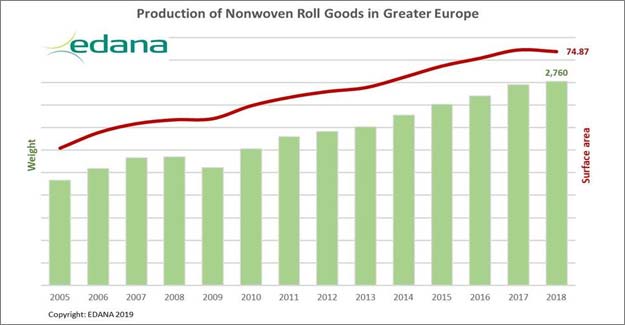
Europe’s Nonwoven Production Grew Slow, Nears 2.8 Million Tonnes In 2018
Europe’s production of nonwovens grew meagrely in 2018 as per the data compiled by EDANA. The International Association serving the nonwovens and related Industries has released European annual statistics for 2018 which offers a comprehensive picture of the nonwovens industry in Greater Europe. According to EDANA, the overall production of nonwovens in Europe grew by around 1.3% in 2018 to reach 2,760,000 tonnes. Over the last decade, the annual average growth rate has been nearly 4%. Jacques Prigneaux, EDANA’s Director, Market Analysis and Economic Affairs said “Despite a slowdown in some important market segments and increasing competition from abroad, the European nonwovens industry showed again its strength, resilience and ability to innovate.” Obviously, diverging trends can be observed in different European countries and between the various production processes of nonwovens. Overall spunmelt output was almost flat (+ 0.9% over 2017) while drylaid technologies recorded an increase of 2.1%. The highest apparent growth within drylaid production (in tonnes) was observed in air-through and hydroentanglement bonding processes, with respectively + 7.6% and + 4.7%. The hygiene segment, still the main end-use for nonwovens by volume, grew by 1.7% in 2018, following a growth of 2.7% in 2017. The main driver of this increase was the development observed in the incontinence market. The most meaningful developments in tonnage for nonwovens in 2018 were in sales of roll goods for personal care wipes (+2.9%), floor covering (-1.2%), civil engineering (-0.3%), automotive interior (-0.5%), electronics (+2.8%) and food & beverage applications (+5.7%). However, these figures do not take into account specific grammage evolutions, which are available to EDANA members thanks to figures in surface area. Jacques Prigneaux added “We would like to thank participating companies. Their efforts in providing us with their input year after year and an improved coverage of the industry result in a valuable business tool to our member companies throughout the supply chain."
Textile Excellence
If you wish to Subscribe to Textile Excellence Print Edition, kindly fill in the below form and we shall get back to you with details.












